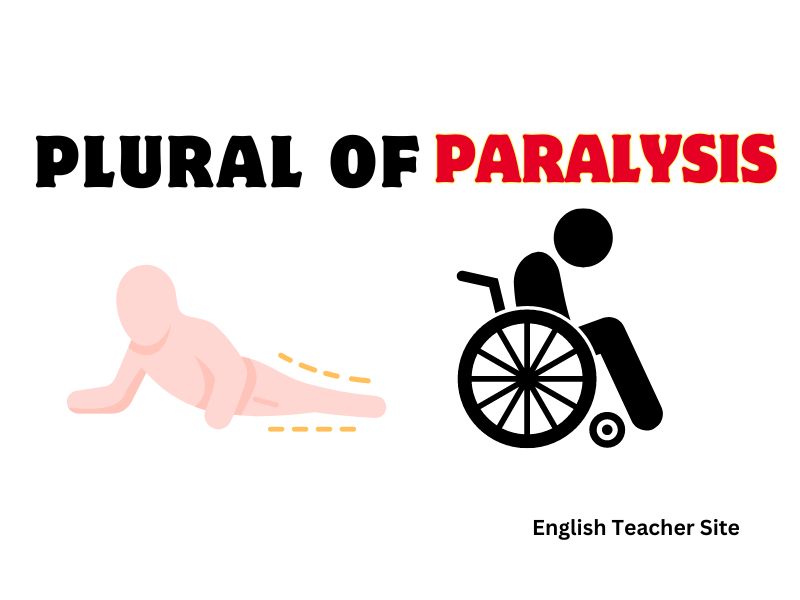Whats the Plural of Paralysis: Understanding Grammatical Nuances

- The plural of “paralysis” is “paralyses.”
- English nouns ending in “-sis” often change to “-ses” for the plural form.
- Proper usage of “paralysis” and “paralyses” depends on context.
The plural form of “paralysis” is “paralyses.” This transformation follows a pattern observed in many English nouns ending in “-sis,” where the pluralization involves changing “-sis” to “-ses.” The usage of “paralysis” and “paralyses” in sentences must align with their singular and plural contexts, respectively, which impacts the meaning conveyed.
What’s the Plural of “Paralysis”?
The change occurs in the last part of the word:
- Singular: Paralysis
- Plural: Paralyses
Here is an illustration of the transformation:
| Singular | Plural |
|---|---|
| -is | -ises |
In this scenario, the ending “-is” is dropped and replaced with “-ises” to form the plural.
Contrast this with regular pluralization in English, demonstrated below:
| Singular | Regular Plural Formation | Plural |
|---|---|---|
| book | book + s | books |
| cat | cat + s | cats |
| bus | bus + es | buses |
On the other hand, “paralysis” is an example of a term that does not follow this regular pattern. It is essential to memorize these exceptions to use them correctly in speech and writing.
- Examples of usage:
- The clinic specializes in the treatment of various paralyses.
- During the seminar, they discussed the causes of different types of paralyses.
Nouns That End in -sis/-ses
When it comes to English nouns that end with the suffix “-sis,” such as “paralysis,” the plural form is typically made by changing this suffix to “-ses.” These nouns often refer to actions, processes, diseases, or states. The transformation follows a classical Greek conjugation pattern, which can be confusing because it deviates from the more common pluralization rule of simply adding an “s” or “es.”
Common Examples:
| Singular | Plural |
|---|---|
| analysis | analyses |
| crisis | crises |
| thesis | theses |
| basis | bases |
This table illustrates how several words adhere to the pattern where the “is” is substituted with “es” to form the plural, a pattern that is consistent among such nouns.
Some nouns have both countable and uncountable variations. In their uncountable form, these words might seem to retain the same spelling in both singular and plural:
- Diagnosis (uncountable: remains the same)
- Hypothesis (countable: changes to hypotheses)
Rules to Remember:
- Nouns ending in “-sis” change to “-ses” in the plural.
- The change applies even if the word is rarely used in the plural form.
- Some nouns are both countable and uncountable, affecting their pluralization.
Examples of “Paralysis” Used in Context
Medical Context:
- Complete paralysis: This involves the total lack of ability to move or feel.
- The spinal cord injury resulted in complete paralysis of her lower limbs.
- Partial paralysis: Here, the loss of movement or sensation is not absolute.
- After the accident, the patient experienced partial paralysis on the left side of his body.
Metaphorical Context:
- Decision paralysis: This refers to an inability to make choices due to excessive options or fear of making the wrong choice.
- With so many vacuum models available, the buyer was overwhelmed by decision paralysis.
- Operational paralysis: This occurs when an organization cannot act effectively, often due to internal dysfunctions.
- The company’s operational paralysis during the crisis damaged its reputation.
Below are tables illustrating the use of both the singular and plural forms in different contexts:
| Singular Usage | Context |
|---|---|
| Paralysis of the vocal cords can lead to loss of speech. | Medical |
| Economic paralysis can have devastating effects on a country. | Metaphorical |
| Plural Usage | Context |
|---|---|
| Hereditary motor neuron diseases can lead to paralyses of various muscle groups. | Medical |
| The new regulations aimed to prevent the paralyses often seen in bureaucratic systems. | Metaphorical |
Examples of “Paralyses” in Context
Paralysis is a medical condition characterized by the loss of muscle function in part of your body. It happens when something goes wrong with the way messages pass between your brain and muscles. Paralysis can be complete or partial and can occur on one or both sides of your body. The plural form of “paralysis” used in various contexts is “paralyses.”
To provide clarity, here are some examples of “paralyses” used within different sentences:
- Medical observations: In a doctor’s report, you may find a sentence like, “The patient exhibits several distinct forms of paralyses due to the spinal cord injury.”
Condition Description Bell’s Palsy A form of temporary facial paralysis Paraplegia Paralysis of the lower limbs - Scientific Research: In the scientific literature, researchers studying paralysis might write, “The various paralyses have been thoroughly analyzed to understand their differing impacts on neural pathways.”
Research Focus Key Finding Muscular atrophy Accelerated in prolonged paralyses Neuroplasticity Adaptive response to paralyses - Literary Use: In literature, an author could describe a scene with, “The sudden paralyses of the town’s industry left the streets quiet and desolate.” Here, “paralyses” refers figuratively to a cessation of activities.
By contrast, the singular form, “paralysis,” would be used when discussing a singular instance, such as in, “Paralysis of the limbs is a common symptom of this disease.”
- Frankenstein by Mary Shelley: “The creature’s presence paralyses the protagonist with fear.”
- The New York Times: “Economic paralyses in the wake of the global pandemic has led to unprecedented unemployment rates.”
Synonyms of “Paralysis/Paralyses”
| Medical Term | Common Usage |
|---|---|
| Palsy | A term often used historically, still found in conditions like Bell’s palsy or cerebral palsy |
| Paraplegia | Referring specifically to paralysis of the lower limbs |
| Quadriplegia | Denotes paralysis of all four limbs |
In general discourse, the following synonyms are identified:
- Immobilization: This term is used to describe an inability to move, often temporally due to a specific condition or restraint.
- Incapacitation: While this term broadly indicates an inability to act, it can be used as a synonym for paralysis, especially in a legal or figurative context.
Below, the synonyms are further categorized based on their applicability to partial or complete loss of muscle function:
Partial Paralysis (Paresis):
- Weakness
- Impairment
- Loss of voluntary movement
Complete Paralysis:
- Loss of muscle function
- Inability to move
- Numbness (in some contexts, this can refer to a lack of sensation, which often accompanies paralysis)
Sources
My name is Khamis Maiouf. I am the creator of the English Teacher Site, dedicated to providing valuable resources and insights for students around the world. With a passion for education and a commitment to helping students enhance their skills, I aim to make English teaching more effective and enjoyable for both educators and students.





